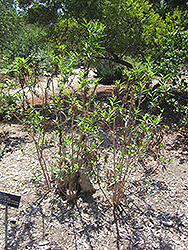It's all about ...
plants

Height: 10 feet
Spread: 8 feet
Sunlight:
![]()
Hardiness Zone: 8a
Other Names: Seep Willow, Mule's Fat
Description:
A large, native, semi-evergreen shrub with upright, arching stems, clad with willow-like, rich green leaves; blooms almost year round with a profusion of small creamy white flowers tinged with pink; excellent for banks, slopes, or as a privacy hedge
Ornamental Features
Mule Fat is bathed in stunning clusters of fragrant creamy white flowers with white overtones and pink tips at the ends of the branches from late summer to mid spring. It has attractive dark green evergreen foliage. The fragrant narrow leaves are highly ornamental and remain dark green throughout the winter. The white fruits are carried on plumes from late summer to mid spring.
Landscape Attributes
Mule Fat is a multi-stemmed evergreen shrub with an upright spreading habit of growth. Its average texture blends into the landscape, but can be balanced by one or two finer or coarser trees or shrubs for an effective composition.
This is a relatively low maintenance shrub, and can be pruned at anytime. It is a good choice for attracting bees and butterflies to your yard, but is not particularly attractive to deer who tend to leave it alone in favor of tastier treats. Gardeners should be aware of the following characteristic(s) that may warrant special consideration;
- Self-Seeding
Mule Fat is recommended for the following landscape applications;
- Accent
- Hedges/Screening
- General Garden Use
- Windbreaks and Shelterbelts
- Naturalizing And Woodland Gardens
Planting & Growing
Mule Fat will grow to be about 10 feet tall at maturity, with a spread of 8 feet. It has a low canopy with a typical clearance of 1 foot from the ground, and is suitable for planting under power lines. It grows at a medium rate, and under ideal conditions can be expected to live for approximately 20 years. This is a dioecious species, meaning that individual plants are either male or female. Only the females will produce fruit, and a male variety of the same species is required nearby as a pollinator.
This shrub should only be grown in full sunlight. It is very adaptable to both dry and moist locations, and should do just fine under average home landscape conditions. It is not particular as to soil type or pH. It is somewhat tolerant of urban pollution. This species is native to parts of North America.
This plant is not reliably hardy in our region, and certain restrictions may apply; contact the store for more information.
